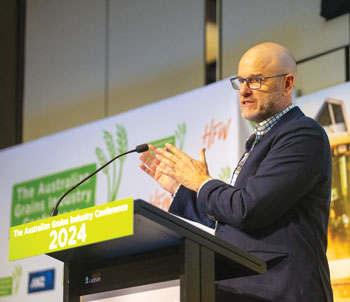The increasing acceptance of gene editing for food crops will allow for more widespread use of advanced technologies to improve production, according to Professor Barry Pogson, director of the ARC Training Centre for Future Crop Development.
Professor Pogson commented on the need for broader public acceptance of genetic techniques that could improve crop performance as part of his keynote address at the recent Australian Grains Industry Conference in Melbourne in August.
 Professor Barry Pogson, director of the ARC Training Centre for Future Crop Development, said growing consumer acceptance may help to advance approval processes. Photo: AEGIC Australia
Professor Barry Pogson, director of the ARC Training Centre for Future Crop Development, said growing consumer acceptance may help to advance approval processes. Photo: AEGIC Australia
He said that while new crop varieties that use such technology are often stalled by regulatory barriers, growing consumer acceptance may help to advance approval processes.
Professor Pogson explained how CRISPR gene editing technology allowed for different levels of genetic manipulation. These ranged from simple “search and replace” edits of the genetic code to remove undesirable traits to inserting whole new “paragraphs or pages of instructions” for new crop varieties.
Traditional breeding processes can also achieve simple edits, but CRISPR can do this much more quickly, precisely and cheaply. This type of genetic manipulation has relatively clear and simple regulations in Australia.
More significant genetic edits that insert new ‘pages’ or even ‘chapters of instructions’ into a plant’s genetic code from other species extend into the realm of genetically modified (GM) organisms. These are highly controlled in Australia through the Office of the Gene Technology Regulator.
Increased use and acceptance
Professor Pogson said 100 GM transgenic crops, which have genetic material introduced from a different species, have received biosafety approval in their relevant countries in the past five years. While negotiating the regulatory processes in relevant countries can take many years, the many approvals showed progress was being made.
He also estimated that 40 different crops in 25 different countries were already being developed with CRISPR technology, which became commercially available about nine years ago. “And that’s probably an underestimate of what’s happening,” he added.
He told delegates there had been a shift in consumer sentiment in the US towards favourable acceptance of gene editing, particularly among Gen Z and Millennials. In Australia, the Office of Gene Technology Regulator has also released the results of its most recent consumer survey, which it has run for the past 20 years.
The survey showed that genetic technologies are more likely to be accepted by consumers when they have confidence in the regulatory system and can see an environmental or societal benefit, and ideally both.
We can’t just do the breeding innovation, Professor Pogson said. We’ve got to think about social licence … about economic viability, the product, the market value, all incorporated into the final practices.
This might include developing “market choice” processes, such as separate production and supply chains for different crops, as has been done with GM canola, he said.
More than 600 delegates attended the 2024 Australian Grains Industry Conference, where Professor Pogson spoke. This year’s conference marked the 25th anniversary of the event, which is organised by Grain Trade Australia. Organisers said delegates were keen to make the most of the in-person networking at the conference, but all sessions were also recorded and will be available on the GTA website.
More information: Grain Trade Australia.

























































